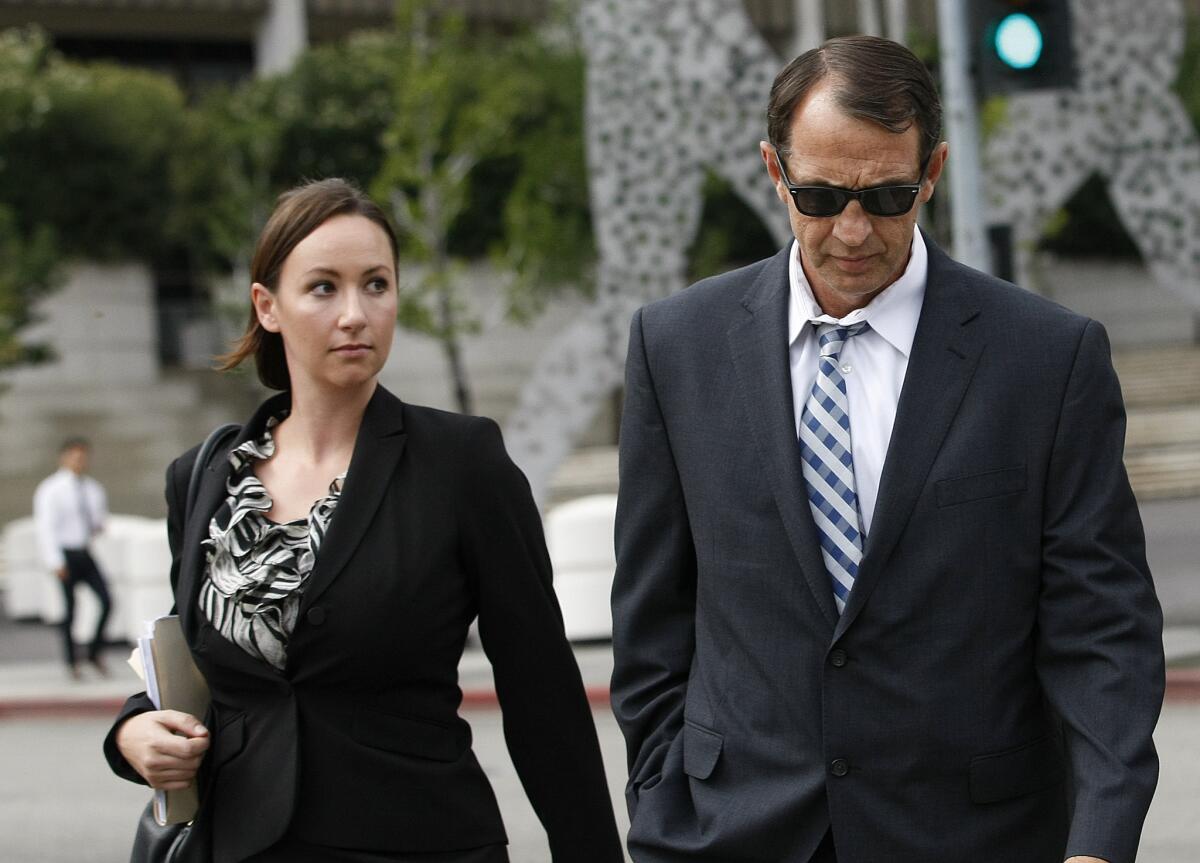Former L.A. County sheriff’s captain agrees to plead guilty in jail scandal

Retired L.A. County Sheriff’s Capt. William Thomas Carey leaves the Roybal federal courthouse in Los Angeles after appearing for an arraignment on May 14.
- Share via
A retired Los Angeles County sheriff’s captain has agreed to plead guilty to lying on the stand and will cooperate with prosecutors, becoming the highest-ranking official to fall in a jail scandal that has already resulted in seven convictions for obstructing a federal investigation.
The plea agreement for retired Capt. William “Tom” Carey was filed in federal court Thursday and could strengthen prosecutors’ case against Paul Tanaka, the department’s former No. 2.
In May, both Tanaka and Carey were charged with obstructing the federal investigation into excessive force and corruption in the county jails. Carey also was charged with two counts of lying for statements he made in two trials of lower-ranking sheriff’s officials.
Tanaka has pleaded not guilty.
In the plea agreement, prosecutors said they would drop three counts against Carey, leaving the single count of lying at the May 2014 trial of sheriff’s Deputy James Sexton.
Sexton was convicted in the obstruction case, which centered largely on allegations that sheriff’s officials hid an inmate informant from the FBI. Six other sheriff’s officials also were convicted of obstruction in a separate trial.
Carey’s attorney, Andrew Stolper, declined to comment.
Tanaka’s attorney, H. Dean Steward, conceded that Carey’s decision to strike a deal and cooperate with prosecutors complicates matters for his client.
But Steward said he doesn’t expect the former captain will be called to testify against Tanaka at trial.
“Once you’ve admitted to lying on the stand, who can believe anything you say?” Steward said.
The version of events described in the plea agreement was “90%” accurate, but the portions indicating that Tanaka was present at certain meetings and gave orders to others regarding what to do with the FBI’s inmate informant were wrong, Steward said.
Steward said he believes that prosecutors flipped Carey to build a case against Tanaka’s boss, former Sheriff Lee Baca.
Baca has not been charged. Court testimony has placed him at some of the meetings where sheriff’s officials discussed moving the inmate informant around the jails and approaching an FBI agent at her home.
“They’re trying to go up the ladder, and Carey and Mr. Tanaka are just rungs on that ladder,” Steward said. “It sure looks to me like they’re going after Baca.”
Steward said he had not discussed a plea deal with prosecutors and would not accept one if it were offered.
“Our client has done nothing wrong,” he said.
Reached by phone, Baca declined to comment. “It would be inappropriate for me to weigh in,” he said. Baca, who retired in January 2014 with nearly a year left in his term, said he has not hired a criminal defense attorney.
Carey’s plea agreement includes a narrative of events that describes meetings Carey attended with Tanaka and others.
At a meeting on Aug. 23, 2011, Tanaka gave approval for Carey and others to move the inmate informant, Anthony Brown, out of Men’s Central Jail, in part to ensure that Brown would not have further contact with the FBI, the document said.
Carey, who at the time was the head of the Internal Criminal Investigations Bureau, authorized deputies to conduct surveillance of an FBI agent and later met with Tanaka and others to discuss approaching the agent outside her home, the document said.
Carey believed the plan was a “tit for tat” retaliation against the FBI for threatening to arrest a sheriff’s deputy for accepting bribes, according to the document.
Carey has agreed to plead guilty to one count of making a false declaration in court for responding “No” when he was asked at Sexton’s trial whether there was any reason to move Brown other than the inmate’s safety.
Carey’s response was false because he knew Brown was being moved to hide him from the federal government, according to the plea agreement’s narrative.
Since Carey has no criminal record, federal guidelines call for a maximum sentence of 15 to 21 months, said Laurie Levenson, a professor at Loyola Law School and a former federal prosecutor.
The plea agreement contains provisions for reducing Carey’s sentence for “acceptance of responsibility.” He could end up with a sentence of home detention and almost no prison time, Levenson said.
Carey’s plea gives prosecutors more ammunition against Tanaka but does not necessarily mean they intend to go after Baca, Levenson said. Still, Carey’s knowledge of high-level deliberations could be cause for concern for both his former bosses, she said.
“It’s got to make both Tanaka and Baca nervous,” Levenson said. “Now you have someone from the higher echelons who can tell prosecutors what was happening and what people at the top did or should have done.”
For more news on the jail scandal at the L.A. County Sheriff’s Department, follow @cindychangLA and @joelrubin
ALSO:
After years of scandal, L.A. jails get federal oversight, sweeping reforms
Indictment: What feds say top L.A. County sheriff’s execs did wrong
Once L.A. County Sheriff’s Department star, Paul Tanaka now defined by scandal
More to Read
Sign up for Essential California
The most important California stories and recommendations in your inbox every morning.
You may occasionally receive promotional content from the Los Angeles Times.












